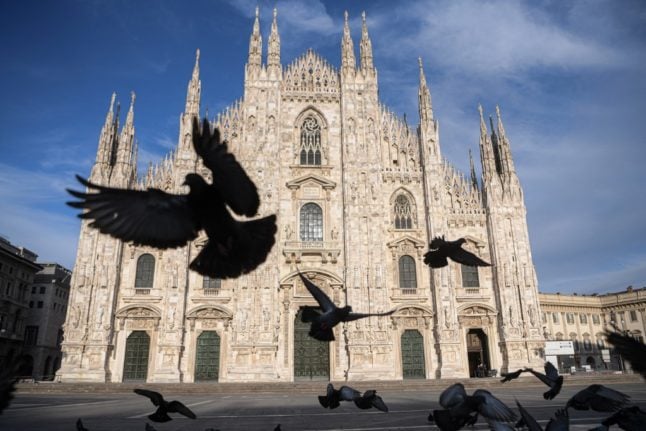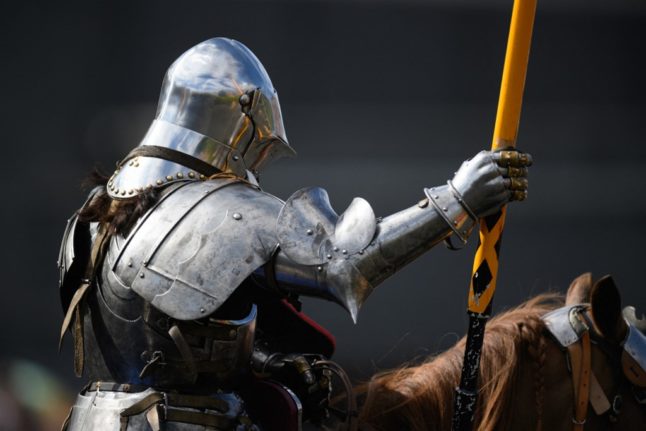REVEALED: The Italian versions of 11 famous English sayings

From full barrels and drunk wives to catching fish, the Italian language has its own unique way of expressing the sentiments behind some of the most popular English sayings.
Though lots of popular English sayings are largely similar (or even identical) to their Italian equivalents, that’s not always the case.
In fact, some Italian translations of famous English idioms can leave language learners perplexed.
Here are a few of our favourite examples.
Non dire gatto se non ce l’hai nel sacco
We all sometimes get ahead of ourselves and start making plans based on something that’s not happened yet (and in some cases may not be likely to happen).
While the English ‘don’t count your chickens before they hatch’ is as good a self-reminder as you’ll find, you may also add the Italian version to your repertoire: ‘non dire gatto se non ce l’hai nel sacco’, which literally means ‘don’t say cat if you haven’t got it in a bag’.
READ ALSO: 'Anglicismi': The English words borrowed into Italian - and what they mean
Why anyone would want to get a cat into a bag eludes us, but here’s an iconic clip of Giovanni Trapattoni using the expression when manager of the Republic of Ireland’s football team:
In alto mare
If, with just one week to go till the start of your holidays, you still have no idea what you’re going to do or where you’re going to go, you could definitely say that your holiday plans are ‘in alto mare’.
While literally translatable as ‘on the high seas’, the idiom is the equivalent to the English ‘up in the air’. Same issues, different natural elements.
Due gocce d’acqua
While an English speaker may describe two people that are closely similar either in appearance or character as ‘two peas in a pod’, an Italian would scrap the grocery reference and describe them as ‘two drops of water’.
Vuotare il sacco
If you’re organising a surprise birthday party for a friend of yours, you may ask all guests to be extra careful and ensure they don’t ‘spill the beans’.
READ ALSO: Etto, ino, ello: How to make Italian words smaller
But if you’re throwing the party in Italy, you’ll have to ask them not to ‘empty the bag’, or 'vuotare il sacco', with the sacco figuratively protecting the big secret from indiscreet ears.
Prendere due piccioni con una fava
The Italian ‘prendere due piccioni con fava’ is actually very similar to the English ‘kill two birds with one stone’, except that the former specifies the type of bird – two pigeons – and uses a different hunting technique: a trap using a fava bean as bait.
An Italian hunting masterclass, clearly.

Catching 'two pigeons with one fava bean' will save you a lot of time in your Italian daily life. Photo by Piero CRUCIATTI / AFP
Ogni morte di papa
The death of a pope is not something that happens very often. Actually, you might even say that it happens ‘once in a blue moon’.
Chi dorme non piglia pesci
Here’s one of Italian dads’ favourite sayings as they try to impress upon their children that much more is achieved by early, decisive action than by idleness.
READ ALSO: 'I'm not Onassis': Seven things Italian dads say and what they mean
‘Those who sleep don’t catch any fish’ is the Italian equivalent of the well-known ‘early bird gets the worm’.
Per il rotto della cuffia
If someone made three mistakes in their Italian driving licence theory quiz, you may say they passed by the ‘skin of their teeth’ as only three errors are allowed.
But an Italian might say that they passed the exam ‘per il rotto della cuffia’, literally meaning ‘thanks to the rupture of the helmet’.

Popular Italian expression 'per il rotto della cuffia' stems from a mediaeval game known as Saracen Joust. Photo by Oli SCARFF / AFP
The saying stems from an old medieval game, the Saracen Joust, where a knight on horseback would have to hit a target with a swinging arm. If the arm hit the rider’s helmet and broke it but did not unseat him, the rider would have gotten away ‘per il rotto della cuffia’.
Come il giorno e la notte
When two things are nothing alike, you might say they’re like ‘chalk and cheese’, but an Italian will surely say they’re ‘come il giorno e la notte’, that is to say ‘like day and night’.
La botte piena e la moglie ubriaca
Sometimes, you just can’t have two things at the same time and you must choose between one or the other.
So, you ‘can’t have your cake and eat it too’ in pretty much the same way Italians might say you can’t have ‘a full barrel and a drunk wife’.
Non sputare nel piatto dove mangi
In Italian, someone who ‘spits into the plate they eat from’ is ungrateful or behaves badly towards the people they receive help from, much like someone who ‘bites the hand that feeds them’ does.
Comments
See Also
Though lots of popular English sayings are largely similar (or even identical) to their Italian equivalents, that’s not always the case.
In fact, some Italian translations of famous English idioms can leave language learners perplexed.
Here are a few of our favourite examples.
Non dire gatto se non ce l’hai nel sacco
We all sometimes get ahead of ourselves and start making plans based on something that’s not happened yet (and in some cases may not be likely to happen).
While the English ‘don’t count your chickens before they hatch’ is as good a self-reminder as you’ll find, you may also add the Italian version to your repertoire: ‘non dire gatto se non ce l’hai nel sacco’, which literally means ‘don’t say cat if you haven’t got it in a bag’.
READ ALSO: 'Anglicismi': The English words borrowed into Italian - and what they mean
Why anyone would want to get a cat into a bag eludes us, but here’s an iconic clip of Giovanni Trapattoni using the expression when manager of the Republic of Ireland’s football team:
In alto mare
If, with just one week to go till the start of your holidays, you still have no idea what you’re going to do or where you’re going to go, you could definitely say that your holiday plans are ‘in alto mare’.
While literally translatable as ‘on the high seas’, the idiom is the equivalent to the English ‘up in the air’. Same issues, different natural elements.
Due gocce d’acqua
While an English speaker may describe two people that are closely similar either in appearance or character as ‘two peas in a pod’, an Italian would scrap the grocery reference and describe them as ‘two drops of water’.
Vuotare il sacco
If you’re organising a surprise birthday party for a friend of yours, you may ask all guests to be extra careful and ensure they don’t ‘spill the beans’.
READ ALSO: Etto, ino, ello: How to make Italian words smaller
But if you’re throwing the party in Italy, you’ll have to ask them not to ‘empty the bag’, or 'vuotare il sacco', with the sacco figuratively protecting the big secret from indiscreet ears.
Prendere due piccioni con una fava
The Italian ‘prendere due piccioni con fava’ is actually very similar to the English ‘kill two birds with one stone’, except that the former specifies the type of bird – two pigeons – and uses a different hunting technique: a trap using a fava bean as bait.
An Italian hunting masterclass, clearly.

Ogni morte di papa
The death of a pope is not something that happens very often. Actually, you might even say that it happens ‘once in a blue moon’.
Chi dorme non piglia pesci
Here’s one of Italian dads’ favourite sayings as they try to impress upon their children that much more is achieved by early, decisive action than by idleness.
READ ALSO: 'I'm not Onassis': Seven things Italian dads say and what they mean
‘Those who sleep don’t catch any fish’ is the Italian equivalent of the well-known ‘early bird gets the worm’.
Per il rotto della cuffia
If someone made three mistakes in their Italian driving licence theory quiz, you may say they passed by the ‘skin of their teeth’ as only three errors are allowed.
But an Italian might say that they passed the exam ‘per il rotto della cuffia’, literally meaning ‘thanks to the rupture of the helmet’.

The saying stems from an old medieval game, the Saracen Joust, where a knight on horseback would have to hit a target with a swinging arm. If the arm hit the rider’s helmet and broke it but did not unseat him, the rider would have gotten away ‘per il rotto della cuffia’.
Come il giorno e la notte
When two things are nothing alike, you might say they’re like ‘chalk and cheese’, but an Italian will surely say they’re ‘come il giorno e la notte’, that is to say ‘like day and night’.
La botte piena e la moglie ubriaca
Sometimes, you just can’t have two things at the same time and you must choose between one or the other.
So, you ‘can’t have your cake and eat it too’ in pretty much the same way Italians might say you can’t have ‘a full barrel and a drunk wife’.
Non sputare nel piatto dove mangi
In Italian, someone who ‘spits into the plate they eat from’ is ungrateful or behaves badly towards the people they receive help from, much like someone who ‘bites the hand that feeds them’ does.
Join the conversation in our comments section below. Share your own views and experience and if you have a question or suggestion for our journalists then email us at [email protected].
Please keep comments civil, constructive and on topic – and make sure to read our terms of use before getting involved.
Please log in here to leave a comment.